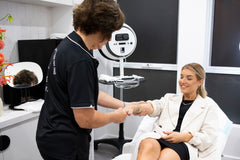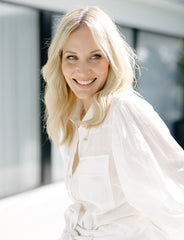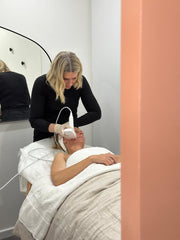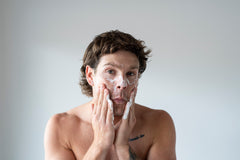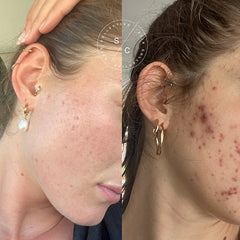The life changing event that shaped her into the woman she is today.
Kind. Compassionate. Strong. Resilient. These are all words anyone who knows Megan, would use to describe her. Funny. Warm. Friendly and self-assured are some other qualities that come to mind.
If you’ve met Megan, you would probably agree with all of the above. She is a human with a big heart and warm soul, making everyone around her feel comfortable, appreciated and genuinely cared for. She is as much a down-to-earth breath of fresh air as she is the life of the party, who loves a wine and a good time with friends.

And while you may know Megan as our Cosmetic Injector Queen and skin saviour - bringing the skin confidence and good vibes one appointment at a time, what you may not know about our bright and bubbly SC babe, is that she is a survivor of the 2002 Bali Bombings.
At just 14-years-old, Megan was the youngest WA survivor of the 2002 terroist attacks in Kuta that killed 202 people. Not only did she suffer severe burns to 36% of her body, shrapnel wounds from head to toe and a severe laceration to her wrist that severed two tendons, Megan tragically lost her father that night as well.
On top of the physical recovery, multiple surgeries, physiotherapy, trips back and fourth from hospital and ongoing rehabilitation, Megan also had to come to terms with the loss of her father while processing grief. Then there were the flashbacks, vivid nightmares, medication-induced hallucinations and traumatic memories that would hit her for six and immediately send her back to the very moment her whole life changed forever.
The more you learn about Megan, her story and the intensity of the years that followed that fateful night, the more you’ll realise just how impressive she really is and how her past experiences have shaped her to be the strong, empathetic and courageous woman she is today.
"The initial recovery phase was my lowest point, there were many times I questioned everything and really struggled just to perform day-to-day tasks. I felt the unjust sorrow of "why me?" a lot in the beginning. I hated people looking at me or having to answer any questions about how I acquired my injuries... it was a constant reminder of the pain and grief."
The very event that changed everything, was also the catalyst for her career choice later in life. The support, compassion and empathy she received from the nurses in hospital, inspired her to pursue Nursing so she too, could help patients during their most vulnerable moments.
As a motivational speaker and ambassador for the Fiona Wood Foundation, Megan has shared snippets of her story before. She has been interviewed by journalists, featured on podcasts and spoken at events, but it’s our turn now to ask Megan the questions to learn in more depth how the events of 12th of October 2002 impacted her life back then, and now.
THEN
When you think back to the time of the Bali Bombings, what is the core memory that sticks in your mind the most?
"How horrible it was to feel so far away from home. That in times when you are scared, fearing for your life and vulnerable, nothing else matters but family. It is an all-consuming feeling and all you want is to have them with you."
What were your injuries? Were any life threatening?
"I had superficial and full thickness (third degree) burns to 36% of my body. Shrapnel wounds and lacerations to my face and body, including a deep laceration to my right wrist, which severed two tendons. Then when I arrived in Perth due to my injuries I was in acute pulmonary oedema, which is fluid on the lungs and can be life threatening. They also say that the mortality rate for burns correlates to the percentage of burns to the body."

What do you remember about the hospital in Bali?
"I remember it being chaotic and loud. It was unbearably hot, not only was my body struggling to control my temperature due to the burns. But there was no aircon in the hospital so there was lots of fans and they were trying to actively cool me using wet towels, ice, etc. I was also in excruciating pain by this point with very limited pain relief available or even staff to administer it.
I didn’t know where my family members were and I didn’t know how I was going to get out of there. All I remember thinking was, how I would do anything to be back home in Perth right now. So much so, that when I heard there was a flight available to Perth but patients had to be able to sit in a chair to fly back, I attempted getting myself out of bed but was unable to and I was stopped by volunteers."
What did rehab and initial recovery look like for you?
"For the first couple of weeks I wasn’t able to do much for myself, including eating. It was about 2 and half weeks before I walked for the first time and that was with the assistance of the physio. It was another couple of weeks after that, before I could shower alone without help. Even once I left hospital, due to the restriction of the burns, I couldn’t wash or do my own hair for about a month, so my Mum had to do it for me.
Dressing changes in hospital were every day, and continued once at home. I also had weekly trips back to the hospital for check-ups, further surgeries and physio appointments twice a week. Getting mobility and strength back was a long process, and I had lots of scar massage to ensure the scarring didn’t get too tight."
"I had superficial and full thickness burns to 36% of my body. Shrapnel wounds and lacerations to my face and body, including a deep laceration to my right wrist, which severed two tendons."
Was there ever a time when you thought you may not survive?
"In all honesty I think I was too confused about what had happened to comprehend how serious my injuries were. I was also really lucky to be surrounded by so many amazing people (in Bali and Perth) who helped me to feel safe and supported."
What was your most significant memory from this time and what gave you motivation to push through?
"To be honest the initial recovery phase was my lowest point, there were many times I questioned everything and really struggled just to perform day-to-day tasks. I felt the unjust sorrow of “why me?” a lot in the beginning. I hated people looking at me or having to answer any questions about how I acquired my injuries. I think because it was a constant reminder of the pain and grief.
Any motivation I did have to push through, definitely came from my support system. I am super close to my family - they went above and beyond for me in my time of need and there's no task big or small they wouldn’t have done. They were my rocks and I wouldn’t be the person I am today without them."
Were you on a lot of medication for pain at the time?
"I wasn’t on that much because I didn’t like the way the medication made me feel. I hated being drowsy and foggy all the time, and I was having terrible hallucinations on some of the medications. I also at that point was having terrible nightmares so the less I was able to sleep throughout the day/night the better. I left the hospital only on over-the-counter pain relief such as panadol and ibuprofen and was happy with that."

Did this experience create any fears, phobias or trauma responses that are still triggered in you now? If yes, how did you overcome them?
"Initially I had loads. As I mentioned before, I suffered nightmares for months afterwards, almost anytime I shut my eyes to sleep. I hated the dark and couldn’t stand to be alone at night time. There were multiple occasions my Mum was called back into hospital in the middle of the night to sit beside my bed because I was inconsolable. When I returned home my Mum purchased multiple night lights to put around the house.
I hated large crowds, even so much as going to busy shopping centres. I became incredibly panicked with loud noises such as fireworks, cars backfiring ect. Most of these fears & anxieties eased with time. By me slowly getting back out there, I was able to get my confidence back. With the help and support of family and friends, I began throwing myself back into the situations that were initially triggering. The only lasting fear I haven’t been able to shake, even now, is my fear of flying. I think this comes from being in pain and unable to move or communicate whilst on the Hercules when I was evacuated out of Bali. However, this fear hasn’t deterred my love of travel and it’s just something I’ve learned to push through because I refuse to miss out on experiences."
NOW
Anyone who knows you, would use the words resilient and strong to describe you. How did this experience make you more resilient?
"Recovering from burns is such a long and gruelling process, not only did I need strength to get through the pain of the recovery, multiple surgeries and rehab, but once leaving the hospital, I had to become confident with my new body and scars. I had to become comfortable with not only looking at my scars in the mirror every day but have strangers stare at them and ask questions as well. Every time someone would ask, I had to relive the most traumatic time of my life over and over again. I guess over time, I built up some resilience around that because it was something I couldn’t really avoid."
What are some things you do for yourself that help you live a whole, balanced and healthy lifestyle?
"I love fitness, challenging myself with new activities and always keeping it fun and interesting.
Exercise plays a huge role in my life. I don’t feel like myself if I’m not exercising. It’s not only about how you look and feel physically, but it helps to keep my mental health strong. I start most days with exercise and the days that I don’t, I really feel the difference in my mood and energy levels. But I also believe in everything in moderation, I’m not too hard/strict on myself. While I love to remain fit, I also love being social & going out to eat and drink with friends & family. I love being outdoors, especially the beach. And I love love love to travel!!"
Was there a time that you thought you would never be able to enjoy these things? If yes, how long did it take you to get through that uncertainty?
"Yes, it took between 12- 24 months before I felt some form of “normality” and was able to perform day-to-day tasks and be active without pain or discomfort."
How do you now overcome challenges in life - what tools or techniques help you in times of adversity?
"I always remind myself that things could be worse and as hard as it seems right now, with time it will get better. In times of adversity I also like to always remind myself of the positives in my life. That there is always something to be grateful for. While I may be going through something challenging, I remind myself how lucky I am to always be surrounded by my amazing family and friends who are so supportive and would be there for me in a heartbeat. By focusing a lot of my attention on the positives it helps to deal with anything negative or challenging that may come up."
If you had any advice for someone who struggles with mindset and even self-confidence challenges, what would it be?
"I think it’s important to remind yourself that we are all going to be faced with bad days and challenges. It’s important to let yourself feel those emotions, be kind to yourself, ask for help or talk it out with loved ones if you need. But remember ultimately, you are the only person who can get you through it. I draw on my inner strength and try not let myself get too far down with negative thoughts."
You are now an ambassador and public speaker for The Fiona Wood Foundation, why are you passionate about this role?
"Dr Fiona Wood has always been my treating doctor, whilst I was an inpatient and even when I became an outpatient. Her medical invention of spray on skin, played a huge role in my recovery, with most of my operations involving it. I don’t specifically remember my first time meeting her, but I definitely remember her in the early days of being in hospital.
I really admire the work and the research the Foundation does. It means a lot to me to be able to help raise funds for ongoing improvements in burns therapy as it’s these improvements that can make such a difference to a patients journey. The research aims to reduce scarring and speed up recovery - two of the most difficult parts of my own experience with burns."
 Fiona Woods and Megan Basioli pictured for The Australian.
Fiona Woods and Megan Basioli pictured for The Australian.

Learn more about the Fiona Wood Foundation and the work they do.
E-Meet Megan and learn more about her holistic approach to skin and aesthetics.
Meet Megan IRL and book in for glow up.





